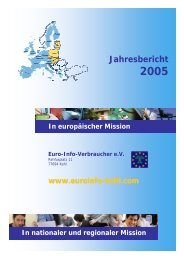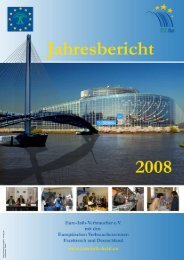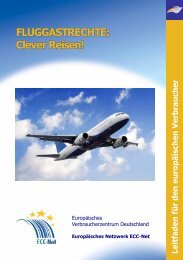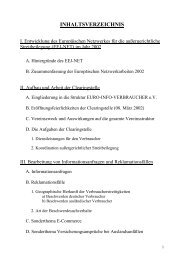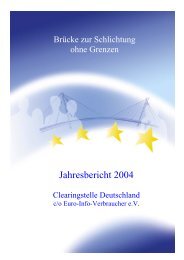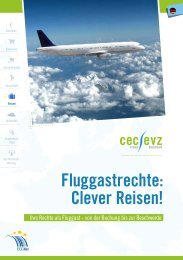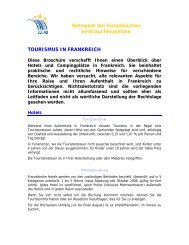Air Passenger Rights: - European Commission - Europa
Air Passenger Rights: - European Commission - Europa
Air Passenger Rights: - European Commission - Europa
Create successful ePaper yourself
Turn your PDF publications into a flip-book with our unique Google optimized e-Paper software.
The Italian ECC told us that the enforcement body<br />
in Italy is inefficient and takes too long to answer<br />
consumers’ requests.<br />
It would appear from the individual contacts that<br />
each ECC has with its own enforcement body, that<br />
many of them are under-resourced and unable to<br />
deal with the responsibilities given them under<br />
the EC Regulation.<br />
The Irish ECC noted, “As the NEB only deals with<br />
complaints that arise from instances that occur in<br />
Ireland, they are not dealing solely with complaints<br />
against Irish airlines. This means they do not have<br />
a complete picture of the Irish airlines’ complaint<br />
handling procedures. In addition the NEB are<br />
poorly resourced and have not taken any court<br />
action. It appears as if the NEB does not have<br />
any teeth, and are not responsible for a lot of the<br />
actions the Irish airlines take.”<br />
The enforcement bodies appointed for the<br />
enforcement of Regulation 2004/261 should be<br />
competent (according to their interpretation of<br />
“competent”) when the take-off occurs on their<br />
territory. Yet, they have no influence on airlines<br />
based in another EU country. This is a contributory<br />
factor in the atmosphere of confusion over the<br />
coverage and responsibilities of each Enforcement<br />
body. There also appears to be a lack of networking<br />
and cooperation between Member States’<br />
Enforcement bodies, which is to the detriment of<br />
passengers in resolving air passenger problems.<br />
The ECC-Net is an advice, information and<br />
assistance network with no powers to “force” an<br />
airline company to respect the Regulation or to<br />
pay compensation claims. If the enforcement<br />
bodies are not undertaking this role, and if there<br />
are no effective ADR bodies, as there are not in<br />
most Member States, then the air passenger is<br />
left only with the option of going to court. This is<br />
not practical course of action, however, for the<br />
reasons discussed later.<br />
Recommendations<br />
• <strong>Air</strong> passengers with a complaint are being<br />
referred from one country’s named enforcement<br />
body to another without any of them<br />
taking responsibility for investigating claims.<br />
There needs to be agreement between the<br />
various designated enforcement bodies in<br />
relation to their jurisdiction. If this cannot be<br />
agreed between them the <strong>Commission</strong> should<br />
be asked to map the coverage to ensure that<br />
air passengers are protected.<br />
• Member States have designated that a body<br />
should be authorised to be responsible for<br />
the enforcement of the Regulation, but it<br />
does not appear that all Member States have<br />
ensured that each body has the resources<br />
required to perform its responsibilities<br />
adequately. As a result passengers are being<br />
effectively disenfranchised.<br />
• Under Article 16 of the Regulation, “the<br />
sanctions laid down by Member States for<br />
infringements of this Regulation shall be<br />
effective, proportionate and dissuasive”.<br />
We are not aware of any body of sanctions<br />
against air carriers which meets this aim, but<br />
there is considerable body of evidence of<br />
problems experienced by air passengers who<br />
have no means to seek resolution.<br />
27




